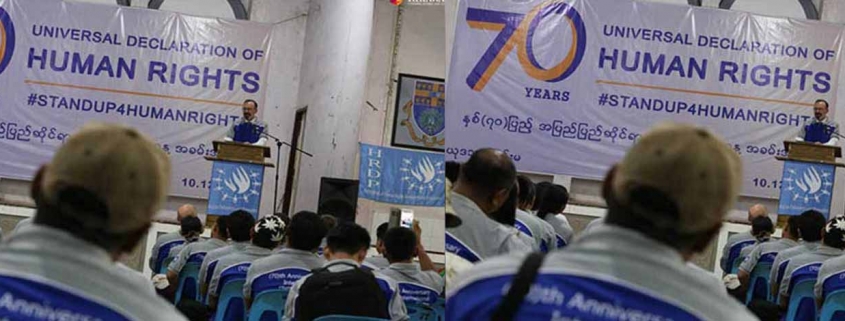Myanmar Advocates Paint Grim Picture on Anniversary of Human Rights Day
CHIANG MAI, Thailand — On the 70th anniversary of International Human Rights Day, advocates said Myanmar’s rights record was deteriorating given the growing number of arrests and court cases against journalists and peace advocates.
Equality Myanmar and the Human Rights Educators Network organized celebrations to mark the occasion across the country on Sunday and Monday.
Addressing a related event on Monday, President U Win Myint said the rights situation in Myanmar had been improved and urged the government and civil society to work with the country’s national human rights commission on improving conditions further.
But not all agreed with the president’s assessment.
“We have seen some development of the human rights situation because the civilian government took the initiative to repeal and amend repressive laws and because of President U Win Myint’s instructions to implement protections against human rights violations. But many challenges remain to fully enjoy basic human rights,” said U Aung Myo Win, director of Equality Myanmar.
He said the government had not enacted enough laws to protect human rights and that Chapter 8 of the Constitution, which guarantees basic human rights for all, had to be fully respected and implemented.
“In additions, there needs to be collaboration between the government departments that respect human rights in every part of the country, not only in Naypyitaw,” U Aung Myo Win said. “Neither the president nor the state counselor can make change for the good alone.”
He said the human rights defenders currently being detained and sued for speaking up for peace and freedom in Myanmar should also have the chance to participate in the anniversary and should not be forgotten.
On Friday, three Kachin activists were sentenced to six months in jail under Article 500 of the Penal Code for protesting in April for the rescue of villagers trapped in the jungle by fighting between the Kachin Independence Army (KIA) and the Myanmar military.
Daw May Sabe Phyu, director of the Gender Equality Network (GEN) and chair of the Alliance for Gender Inclusion in the Peace Process (AGIPP), said the government was increasingly targeting journalists and people advocating for an end to the country’s decades-long civil war.
Ko Ye Wai Phyo Aung, co-founder and research manager of Athan, a local group that promotes freedom of expression, highlighted the repressive laws still being used to arrest and charge them.
“Therefore there is still widespread violation of human rights in our country,” he said.
Ko Ye Wai Phyo Aung said 31 cases have been filed using the Peaceful Assembly and Procession Law that have led to charges so far this year, far more than in 2017 or 2016. Since April 2016, he said, more than 150 people have been charged for breaking the law in 43 cases.
“We have to first ask whether we can freely express our opinions, which is a fundamental thing,” said Maung Saung Kha, a poet and co-cofounder of Athan who received The Netherlands’ 2018 Haman Rights Tulip award, which honors inspiring and courageous human rights defenders.
“What I am sure of is that access to our rights at this moment is getting worse,” he said. “There are more cases of people being charged under Article 66 (d) of the Telecommunication Law and the Peaceful Assembly Law, of restriction on protestors, of journalists being sued and the continuous human rights violations in the ethnic [minority]areas, including Kachin and Rakhine states.”
Daw May Sabe Phyu said there were some positives, including a recent legal amendment stiffening the prison sentence for the sexual abuse of girls and women.
But she said it was also getting harder to reach people in need of aid in Myanmar’s war-torn regions, especially in Kachin State — where fighting between the military and KIA since 2011 has displaced more than 120,000 people — and especially in the last two years.
The military again told aid groups this year not to visit some of the displacement camps and warned that they could be charged under the Unlawful Associations Act if they did, said Reverend Hkalam Sam Sun, chairman of the Kachin Baptist Convention.
Local authorities have regularly used the act to charge people suspected of communicating or associating with the KIA.
“Travelling to the [camps]to provide aid and food is getting more difficult,” Rev. Hkalam Sam Sun said.
He said the Kachin, who are predominantly Christian, were also still facing religious persecution and extra hurdles when applying for permission to build churches, all while the arrival of more Myanmar military soldiers has brought with it a wave of new Buddhist stupas and pagodas.



